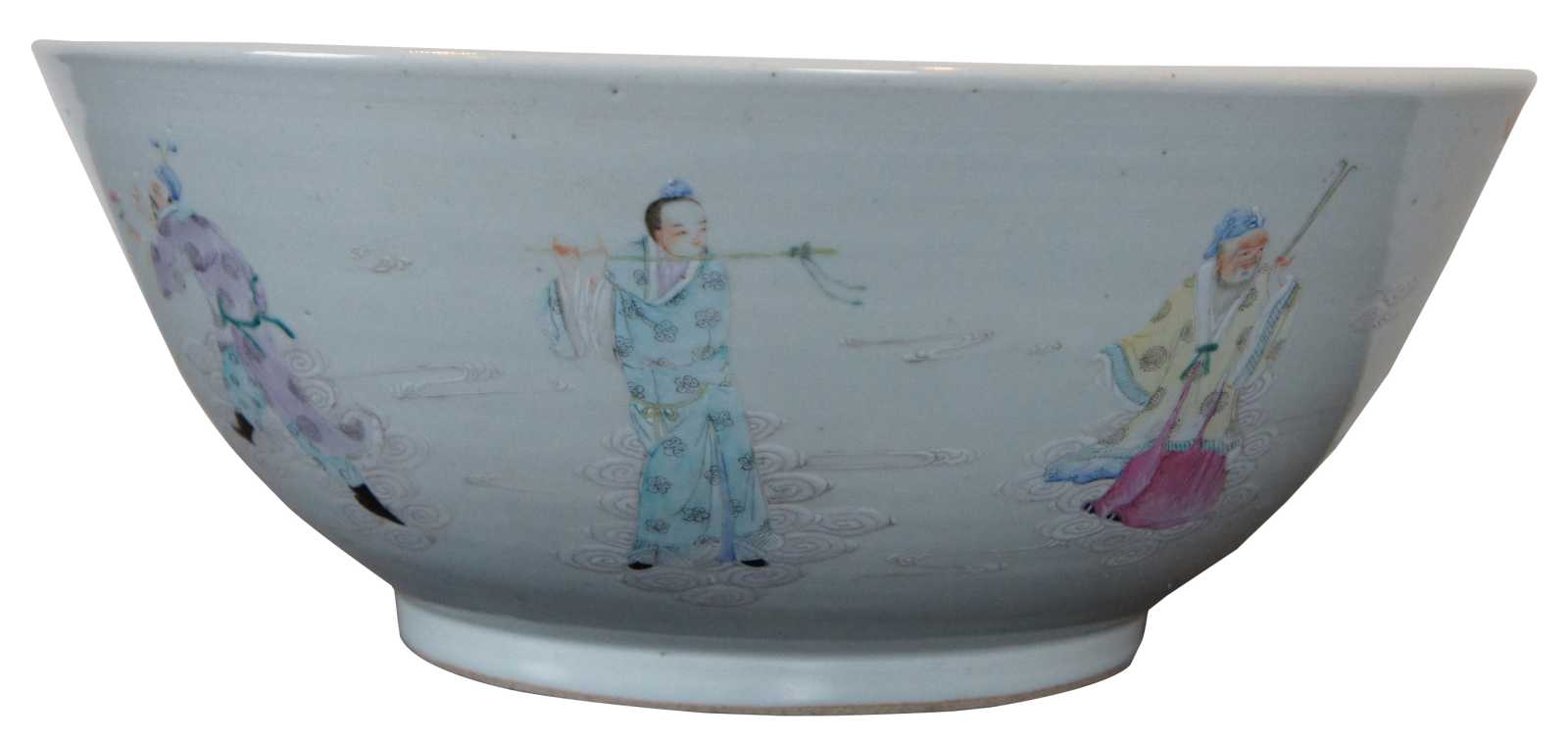
Antique Japanese Polychrome Imari Porcelain Bowl Seven Lucky Gods Figural 14"
Sold
Shipping:
Free Shipping Included
Delivery:
Estimated 2-15 Business Days
Payments:
Credit Card, Check, Cash, PayPal, Apple Pay, Venmo
Returns:
30 Days 100% Money Back Guarantee, Buyer Pays Return Shipping
Description
Antique 19th century Meji era, Japanese polychrom porcelain bowl, hand painted in the arita or imari style with the Seven Lucky Gods standing on clouds. “In Japanese folklore the Shichifukujin are the Seven Lucky Gods who may also be known as the Seven Gods of Happiness or the Seven Gods of Good Fortune. The seven gods are in fact of diverse origin as some are originally from Buddhism, some are from Shinto, and still others come from Chinese tradition.
There are varying traditions of which gods actually make up the group but the established seven are:
Ebisu
Daikoku
Benten
Bishamon
Fukurokuju
Jurojin
Hotei
Although each generally represents good fortune, they also have particular characteristics and associations.
The Seven Gods
Ebisu - is probably of Japanese origin, is a Shinto god, the patron of work, specifically tradesmen, farmers and fishermen, and is usually depicted wearing Japanese costume and headdress. He has a portly figure, large swollen earlobes, and he usually has a fishing rod in his right hand whilst in his left is a large, freshly caught fish - a tai (sea bream, sea bass or dorado), itself a symbol of good luck. Perhaps due to his successful catch, Ebisu is always smiling. In later tradition, Ebisu is identified with Hiruko, the first offspring of the gods Izanagi and Izananmi. Traditionally, Ebisu is celebrated in an annual feast held on the 20th of October.
Daikoku - is of Japanese origin, is the god of wealth, prosperity and the kitchen, the patron of farmers and leader of the Shichi Fukujin. In his right hand he carries the hammer of riches which can grant wishes and has a large bag of treasures slung over his shoulder. He is dark-skinned, is usually standing or sitting atop two sacks of rice and, like Ebisu, he has a full figure and large earlobes. He is traditionally associated with the Hindu god Shiva and the Buddhist god Mahakala.
Benten (or Benzaiten) - is of Hindu origin and the only one of the group who is female. She is the goddess of love, fertility and reasoning. She is usually depicted playing the biwa, a type of lute or guitar, and riding a dragon or sea-dragon to whom she married according to some traditions and, thereby, ended the dragon's attacks on the island of Enoshima. Her special messenger is a white snake and she is often associated with the sea where many of the shrines dedicated to her are located. For Buddhists, she is the patron of wealth, literature, and music, and she is also the embodiment of femininity.
Bishamon (or Bishamonten or Tamon) - is the god of happiness and war, is the patron of warriors and protector of the righteous. He is depicted in full Chinese armour and carrying a lance in his left hand. In his right hand he has a small pagoda building which represents a treasury. Traditionally he is associated with the Hindu and Buddhist deity Kubera or Vaisravana. Shiga, the temple city founded around the 6th century CE, was dedicated to the god in thanks after Shotoku Taishi won a battle at the site.
Fukurokuju - is of Chinese origin but his Japanese name signifies happiness (fuku), wealth (roku), and longevity (ju); he is, therefore, known as the god of wisdom and longevity. Traditionally he is considered to have once been a mortal and lived as Taoist sage and is commonly attributed the power of resurrecting the dead. He is depicted as short in height but with a very high forehead and is usually to be found in the company of a stork or crane.
Jurojin - is also of Chinese origin and likewise god of longevity and wisdom; he is usually represented with a stag at his side, and he carries a long stick to which is attached a scroll containing all the wisdom of the world. Like Fukurokuju, legend states that he once lived on earth as a Taoist sage. He is also represented as an old man with a white beard but wears a scholar's headdress.
Hotei (or Hotei-osho) - is also originally from China, Hotei represents thrift and philanthropy, as well as contentment. He is perhaps the god who is portrayed in the most unflattering light as a fat, bald, and rather unkempt-looking Buddhist monk with a big exposed belly and large swollen earlobes. However, always chuckling and often surrounded by children, he is perhaps the happiest looking of the seven gods and lives up to his Chinese nickname as the 'Laughing Buddha'.”
Condition
Good Overall – Some spots/light crazing on bottom; see pictures
Dimensions
14.375” x 5.875” (Diameter x Height)










